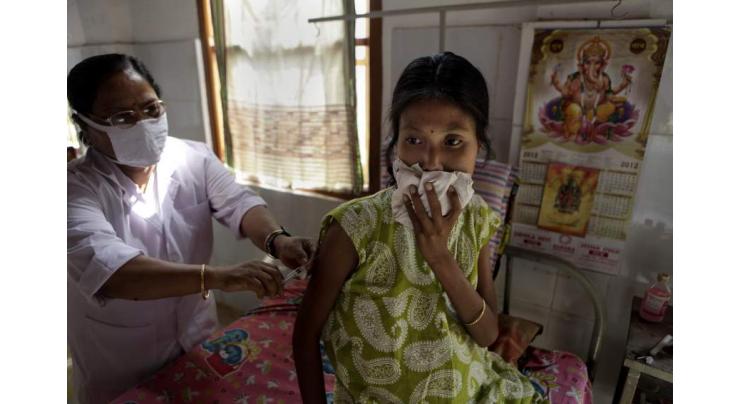
- Home
- Health
- News
- Increased diagnostic testing for drug resistance TB will enhance patients’ treatment outcome
Increased Diagnostic Testing For Drug Resistance TB Will Enhance Patients’ Treatment Outcome
Mohammad Ali (@ChaudhryMAli88) Published March 18, 2024 | 07:13 PM

On World Tuberculosis Day, Doctors Without Borders/Medecins Sans Frontiers (MSF) encourages medical service providers and practitioners in Pakistan to enhance drug resistant tuberculosis (DRTB) diagnosis by increasing the use of GeneXpert diagnostic testing among suspect tuberculosis (TB) cases
PESHAWAR, (UrduPoint / Pakistan Point News - 18th Mar, 2024) On World Tuberculosis Day, Doctors Without Borders/Medecins Sans Frontiers (MSF) encourages medical service providers and practitioners in Pakistan to enhance drug resistant tuberculosis (DRTB) diagnosis by increasing the use of GeneXpert diagnostic testing among suspect tuberculosis (TB) cases.
Additionally, patients who do not show improvement with initial TB treatment need to be urgently referred to health facilities specialized in treating DRTB.
According to a press statement, MSF medical team is concerned that DRTB patients referred to the MSF managed Programmatic Management of Drug-Resistant Tuberculosis (PMDT) site in Gujranwala district, Punjab, are only a fraction of people infected in the community and that a significant portion of DRTB cases is going undetected and untreated.
“Many of the patients we see at the PMDT clinic have been misdiagnosed and have a history of unsuccessful treatment regimens, characterized by a cycle of temporary improvement followed by relapse,” says Dr. Shoaib, MSF medical coordinator.
“With the correct treatment these patients have a good chance of recovering, but they need to be identified as DRTB patients first,” he says.
National statistics confirm this concerning trend of low enrollment of DRTB cases, indicating that many individuals infected with DRTB are either undetected or misdiagnosed.
In Gujranwala, only 136 out of the expected 340 DRTB cases were enrolled at the PMDT site in 2023.
World Health Organization (WHO) data show that at the national level the ratio is even more significant, with only 23% of the estimated 20.000 DRTB cases being identified1 and receiving appropriate treatment.
WHO ranks Pakistan as the fourth highest-burden country for DRTB world wide.
Tuberculosis is a major public health problem and is an infectious disease caused by a bacterium that primarily targets the lungs but can also impact other parts of the body and lead to life-threatening complications.
Though TB is treatable with antibiotics, bacterial resistance to commonly used TB medications can develop, causing the treatment to become ineffective.
At the MSF PMDT clinic, referred patients are tested with a GeneXpert testing machine which, in a matter of hours, allows our doctors to accurately diagnose TB, determine which drugs are effective against it and start the patient on treatment.
GeneXpert molecular diagnostic testing is preferable to smear microscopy which identifies less than half of all TB cases and does not detect resistance to rifampicin. It is a more flexible testing method that can process non-sputum samples, such as stools and tissue, to help detect extra pulmonary and paediatric DR-TB cases.
“By optimizing the utilization of existing GeneXpert machines and increasing the number of locations where people can get tested, we can improve the early detection of DRTB cases” says Dr. Shoaib. “This will lead to better treatment outcomes and significantly contribute to stopping the spread of the disease within the communities”.
MSF is working with Pakistan medical authorities and other health actors to improve case-finding, providing for instance, training sessions to staff from health facilities on the effective utilization of GeneXpert equipment.
With the national TB programme focusing on prioritizing the detection of DRTB cases in the coming years, a further reduction in the price of GeneXpert cartridges, building upon the initial modest drop announced in September, would help increase testing capacity and effectively curb the disease.
Recent Stories

Govt's wheat procurement target increased upto 1.8 metric tons

SC forms six-member bench to IHC judges'letters

PM to take part in World Economic Forum meeting in Riyadh today

Punjab Police officer Riffat Bukhari wins global award

Punjab Police Hero ASP Shehbano Naqvi’s wedding festivities spark joy

TECNO CAMON 30 Series set to launch at a grand fashion show in Karachi

Record growth being witnessed in IT exports due to SIFC’s efforts

Pakistan, Canada agree to enhance cooperation in all fields

Currency Rate In Pakistan - Dollar, Euro, Pound, Riyal Rates On 27 April 2024

Today Gold Rate in Pakistan 27 April 2024

HEC reviews curricula for environmental sciences degree programme

ICC Asia looking forward to an action-packed Asia Cricket Week
More Stories From Health
-

Vaccines save at least 154 million lives in 50 years: WHO
3 days ago -

UHS to issue MBBS degrees within three months after final result
3 days ago -

Rawalpindi woman gives birth to six babies
8 days ago -

DC calls for intensive anti-polio drive in ICT
9 days ago -

World Hemophilia Day observed to underscore importance of providing comprehensive care
10 days ago -

Six in a family with heart on the 'right side'
10 days ago
-

Diabetic disease increasing rapidly : Dr. Noor Elahi Memon
10 days ago -

World Hemophilia Day observed
10 days ago -

ATC dismisses bail petition of doctor involved in illegal kidneys transplant
18 days ago -

Dr. Shehzad warns against deviation from WHO guidelines on anti-smoking
18 days ago -

Health activists express concerns over attempts to derail tobacco control
20 days ago -

UHS declares MBBS first prof, MS urology exam results
29 days ago











